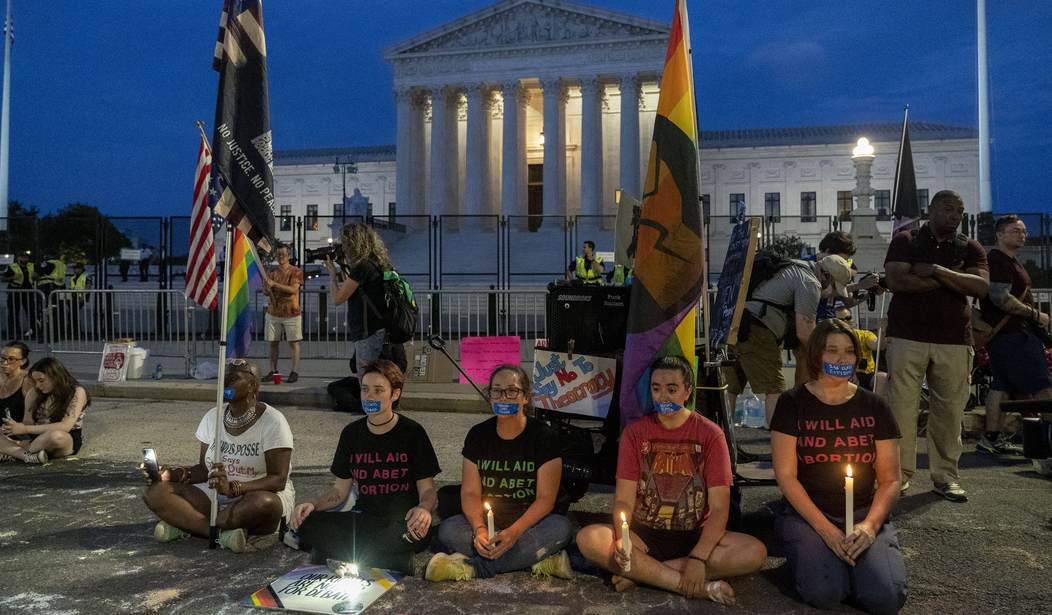An interesting number, if indeed it’s not just the product of a momentary opposition to the outcome of Dobbs. According to a new survey from the Associated Press and NORC, term limits for Supreme Court justices has reached a consensus level with the American electorate. Two thirds, including a majority of Republicans, want to see justices forcibly retired one way or another rather than serve a life term on the top court.
Getting to that point is trickier than just a poll, however:
About 2 in 3 Americans say they favor term limits or a mandatory retirement age for Supreme Court justices, according to a new poll that finds a sharp increase in the percentage of Americans saying they have “hardly any” confidence in the court.
The poll from The Associated Press-NORC Center for Public Affairs Research finds 67% of Americans support a proposal to set a specific number of years that justices serve instead of life terms, including 82% of Democrats and 57% of Republicans. Views are similar about a requirement that justices retire by a specific age.
The poll was conducted just weeks after the high court issued high-profile rulings including stripping away women’s constitutional protections for abortion and expanding gun rights. The poll also shows more Americans disapprove than approve of the court’s abortion decision, with just over half saying the decision made them “angry” or “sad.”
The court, which is now taking a summer break, will return to hearing cases in October with diminished confidence among Americans. Now 43% say they have hardly any confidence in the court, up from 27% three months ago.
This follows two-plus months of full-bore media coverage of Dobbs and the end of Roe, coverage which mainly consisted of wailing and gnashing of teeth. If this holds up in October, say, or perhaps into next year, perhaps then this might be an actionable consensus. At the moment, it looks more like a paroxysm of unhappiness over a single decision rather than a sea change that would enable a successful constitutional amendment to change the foundational structure of Article III — lifetime tenure for federal judges.
That is what it would take, too, and it’s not likely to happen. Lifetime tenured is guaranteed in Article III Section 1 of the US Constitution, which states:
The Judges, both of the supreme and inferior Courts, shall hold their Offices during good Behaviour, and shall, at stated Times, receive for their Services, a Compensation, which shall not be diminished during their Continuance in Office.
“During good Behaviour” means that federal judges at all levels can only be forced out of office through impeachment and removal by Congress. The framers intended to insulate the federal judiciary from public opinion and populist passions with lifetime appointments. Only a constitutional amendment can change this structure, which requires either a constitutional convention or passage by two-thirds in both chambers of Congress, and then ratification by three-quarters of the states.
That leaves two questions: is this a good idea, and does it have any chance of success? The fact that it’s arising due to public opinion over a single court decision more or less validates the framers’ reasoning for lifetime appointments in Article III Section 1. That’s even more the case given that the decision in Dobbs actually limited judicial arrogance and usurpation of the Article I power of Congress rather than abused the constitutional separation of powers. There may have been a better argument for this after Roe and Casey, as those decisions involved real judicial expansion into policymaking without any constitutional checks against that arrogation.
It’s tough to see how returning issues to the people and the legislatures in Dobbs and expressly limiting the judicial branch’s reach into policy creates a crisis now that requires rewiring Article III. It’s just that the court’s decision was unpopular, and our normal reaction to unpopular policy is to replace the policymakers. That’s why the framers separated policymaking from Article III and why they separated electoral accountability from the judicial branch as well.
Second question: will a constitutional amendment succeed? Not a chance, at least not soon. Democrats might float the proposal as a way to pander to voters before the midterms — in fact, I’m surprised they haven’t already — but Republicans won’t go for it in either chamber, nor should they. (It’s very likely that some Senate Democrats would balk at it too, so it may hold some risk of backfire on Joe Biden and Democratic leadership.) Democrats could hold an Article V constitutional convention, but most states would balk at joining.
However, there is no way that 38 states will ratify such a proposal regardless of whether it comes from Congress or an Article V convention anyway. This is too dramatic a change and too narrow a focus for it. States would be far more likely to ratify term limits for members of Congress than for the federal judiciary, and have far better reasons for doing so.
Still, if this persists for a couple of years, those political considerations could change. It’s well worth watching, but it will take a lot more consensus over a long period of time before states will agree to destabilizing the federal judiciary even more than the SCOTUS wars in the Senate over the past 20-30 years have done. And if the Supreme Court continues to send issues back to legislatures and narrow their role back to their proper constitutional limits, the SCOTUS Wars and the perceived necessity of this proposal may end up mooted anyway.








Join the conversation as a VIP Member